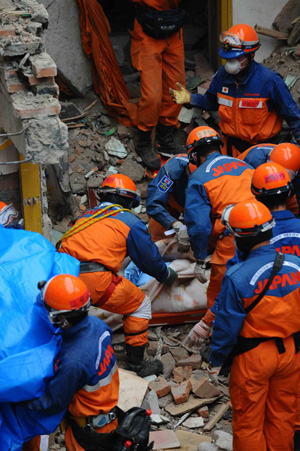Around 3 a.m. Saturday. The only noises resounding in the deadly quietness in the Qingchuan County seat, devastated by an enormous earthquake, were the rumbles of an excavator.
 Japanese rescuers, the first group of foreign rescue professionals to arrive in the quake-stricken province, were searching for a mother Song Aimei and her 70-day-old daughter in the debris of a building at Jiefang Street.
Japanese rescuers, the first group of foreign rescue professionals to arrive in the quake-stricken province, were searching for a mother Song Aimei and her 70-day-old daughter in the debris of a building at Jiefang Street.
In Qingchuan, the death toll was approaching 1,900 after the 7.8-magnitude earthquake battered southwest China's Sichuan Province Monday afternoon and was felt in many parts of the country.
The mother and baby had been buried for more than 110 hours and the 31 Japanese rescuers had worked around the clock since they arrived 24 hours before.
"I have never seen so grim situation in Japan," said a rescuer surnamed Nakajima.
The six-story building was where the employees of the county's traditional Chinese medicine hospital and their families lived. The quake turned it into piles of debris some three meters high.
As of 2 p.m. on Saturday, 28,881 people were confirmed dead nationwide in the massive earthquake and the death toll is estimated to exceed 50,000.
The Japanese team, all dressed in orange-blue uniforms, had found no life sign under the ruins with the life searching and location device and they decided to use large excavators to speed up the rescue effort at 5 p.m. on Friday.
"Now, the chance for the victims to survive is very slim, but we also had precedents to find survivors days after being trapped. So, we won't give up," said Takashi Koizumi, head of the Japanese team.
Local quake survivors volunteered to send the rescuers supper in the evening, together with instant noodles and boiled water. The Japanese finally got something warm to eat since their arrival.
"Please express our sincere gratitude to them. Thanks for coming to help us from so far away," a young man, who only gave his surname Wei, told Xinhua reporters at the site.
Most residents like Wei in the county seat became homeless after the quake and they stay overnight in tents or temporary shelters built with tarpaulin.